AREA OF EXPERTISE
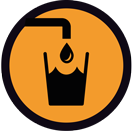
Water, hygiene and sanitation
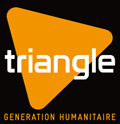
AREA OF EXPERTISE

Water, hygiene and sanitation
FUNDING
More than two-thirds of Yemenis (17.8 million people) today need assistance to meet their basic water, sanitation and hygiene needs and for 12.6 million of them this need is acute. The public-sector water and sanitation systems are incapable of providing a minimum level of service and are often close to collapse. Only 46% of the urban population is connected to the public water networks, which are partially operational, and over 55% of the population has no access to drinking water, which forces them to turn to sources of non-potable drinking water despite only 24% of households stating that they treat their water at home. Around 60% declare having dumped waste in public places due to both a lack of waste collection systems and a lack of awareness about the possible harms. Soaring prices and the slump in spending power have created new economic barriers to accessing drinking water and personal hygiene items.
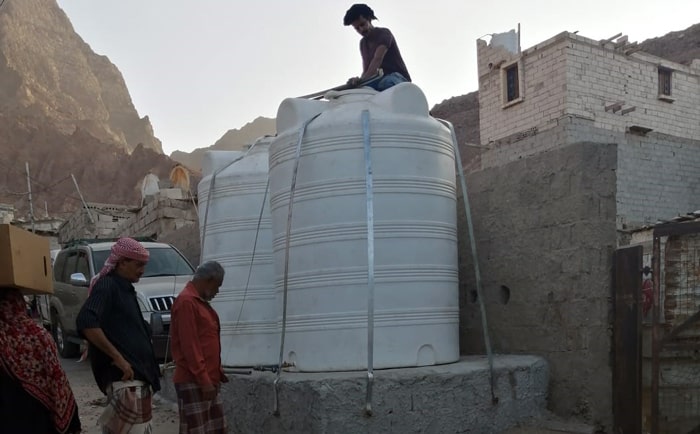
Installation of water storage tanks, photo Sanad Anis, February 21
The critical water and sanitation situation is a key factor in the spread of infectious diseases and increases the risk of cholera, malnutrition and other diseases linked to water and sanitation. Although there is a lack of reliable data regarding its prevalence, the Covid–19 epidemic has increased the demand for water and hygiene items, the lack of which obstructs the promotion of preventive measures. Combined with mass population displacements and loss of livelihoods, this situation has led communities to use coping mechanisms and WASH practices which are harmful to health, in particular for children.
The situation in the Aden governorate, which has experienced some of the largest population displacements due to the conflict (59,598 displaced persons and 299,412 repatriations in 2019), is of particular concern. There are 800,000 people in the governorate in situations of extreme vulnerability, including 40% in what is considered to be a critical state. There are ongoing high levels of food insecurity, reflected in the nutrition indicators: with an overall prevalence of acute malnutrition of 15.5% and 2.1% prevalence of severe acute malnutrition. These figures make the Aden governorate one of the worst affected in the country and the current water, sanitation and hygiene conditions are a direct contributing factor to these high levels of malnutrition.
In order to help rapidly improve hygiene and sanitation conditions in the particularly under-served neighbourhoods targeted by the project, and to better fight disease vectors and multi-causal malnutrition, the project will provide emergency WASH services, notably drinking water supplied from tankers and personal hygiene items.
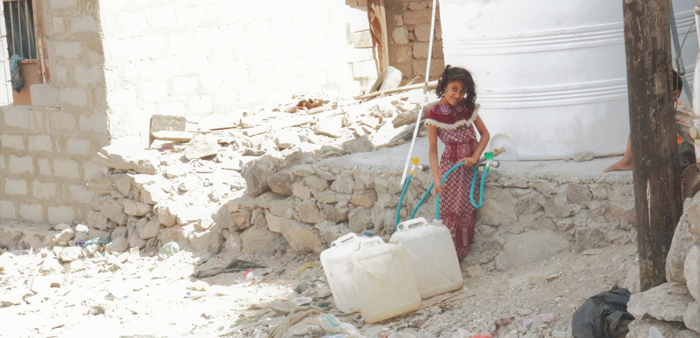
Girl collecting water at installed and filled water tank, photo Sanad Anis, March 21
The proposed intervention has been designed to contribute to meeting households’ overall need for water and does not aim to cover this entirely but to complete provision whilst guaranteeing that a sufficient proportion of all the water available to the household is fit for human consumption. The project has therefore been designed to provide 8 litres of drinking water per person, per day, on the understanding that access to water is highly disparate and that the quantities actually collected may vary from one family to another. In this way the project will regulate supply ensuring each of the targeted families has access to water compliant with minimum standards.
In parallel, the project will supply personal hygiene items, targeting as a priority the most vulnerable families (1,500 families or 10,500 people) to support the promotion of good hygiene practices, including in relation to the current ongoing epidemics. Members of the community, where possible women, will be mobilized, made aware of the issues and trained and will disseminate simple key messages regarding water use and good hygiene practices in their neighbourhood and at water distributions. They will also be responsible for leading operations to clean and disinfect the containers used by families, under the supervision of TGH staff.
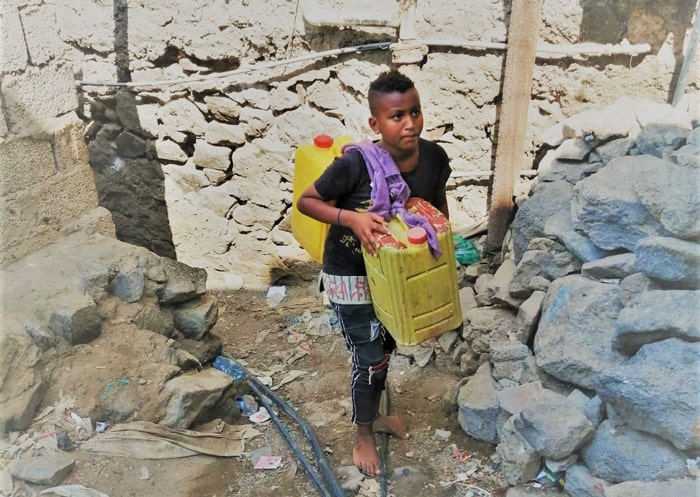
Child collecting water before the program, photo Sanad Anis, TGH